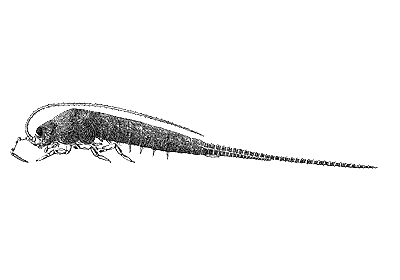 |
Order
- ARCHAEOGNATHA
(Greek, archaeos = ancient; gnatha = jaw)
Common Name: bristletails
Distribution: Cosmopolitan
Description
Bristletails are primitive wingless insects. At first glance they resemble
silverfish, however silverfish have three abdominal filaments nearly equal
in length. In bristletails, the central filament is much longer than the
side two. Unlike silverfish, bristletails have well developed compound
eyes. The compound eyes are large and meet on the back of the head. Three
simple eyes (ocelli) also occur on bristletails. Bristletails have well
developed mandibles which are partially hidden in the head. The antennae
are long and resemble a chain of beads (moniliform). Bristletails are
usually nocturnal and have an interesting habit of "arching and
flexing" the body to give a springing action similar to springtails.
Bristletails are found in litter, moss, lichens and other similar
habitats.
Nymph
There is no metamorphic life cycle: egg-larva-pupa-adult.
The juvenile (nymph) emerges from the egg as a replica of the adult and develops
through moults. Eventually a final moult leaves it sexually mature.
Members
Bristletails.
Food
Bristletails feed on plant detritus, algae, lichens and mosses.
Importance
Bristletails have no known importance apart from the usual roles played by
litter re-cycling organisms in ecosystems.
|